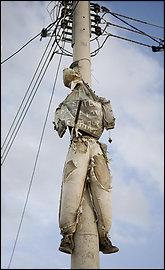At least 563 private security guards, aged between 18 and 50 years, serving in the 39 companies legally established in La Paz to provide physical protection and electronics particular persons, property, and institutions.”They are registered 563 (officials) that offer some of these services in La Paz. All are old, “said Lt. Col. Miguel Angel Rivera, head of the Chief Control of Private Security Companies (Jedecoes).
Insight Crime did a great post on the alarming increase in the use of private security in Bolivia. According to IC, one of the main reasons why it has exploded is the lack of trust the population has in it’s law enforcement.
You know it is bad when 85 % of the people who live in four large cities in Bolivia, do not report crimes. There is also a lot of vigilantism going on, as reported by the Economist (and raising scarecrows to warn criminals). Not to mention the cartels and organized crime there.
What is interesting to me is that these guards are not allowed to be armed. My thoughts about this is that perhaps because of this restriction on guards, that the illegal security outfits are popping up to fill that void? IC made this comment.
In 2010, it was found that only around 15 percent of private companies in the eastern city of Santa Cruz, an organized crime hotbed, were legal.
If cartels are operating there, then it is possible that most of these illegal companies are criminally related. Or, they could be companies actually trying to provide an effective service in a dangerous world.
Also, if the demand is that high for security and the government is not moving fast enough to certify or regulate, then supply versus demand economics will apply. Someone will fill the need as they say, and it looks like PMSC’s in Bolivia are very much in demand… –Matt

563 private guards watched in La Paz
September 9, 2012
At least 563 private security guards, aged between 18 and 50 years, serving in the 39 companies legally established in La Paz to provide physical protection and electronics particular persons, property, and institutions.”They are registered 563 (officials) that offer some of these services in La Paz. All are old, “said Lt. Col. Miguel Angel Rivera, head of the Chief Control of Private Security Companies (Jedecoes).
A licensed private security company, according to the National System of Public Safety, develops preventive surveillance and early warning under custody and in close collaboration with the Police. For his actions, trains its employees on issues of emergency, first aid, environment, customer service and more.
“We do not act violently. Is not permitted. Our main objective is to develop an efficient system of prevention, only if there is imminent risk, if we intervene, “said Raul Moreno, CEO of Radar.
